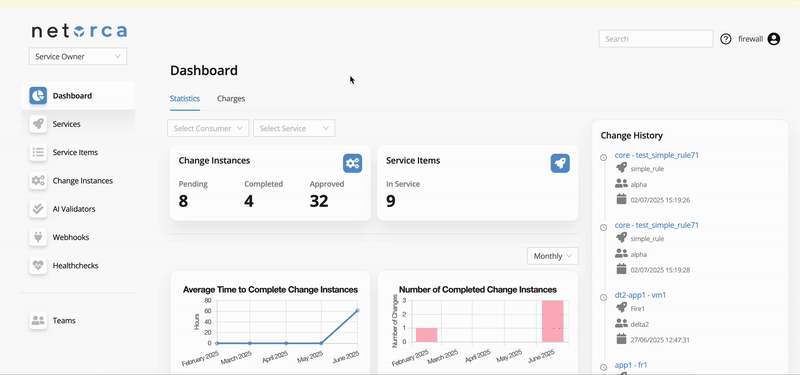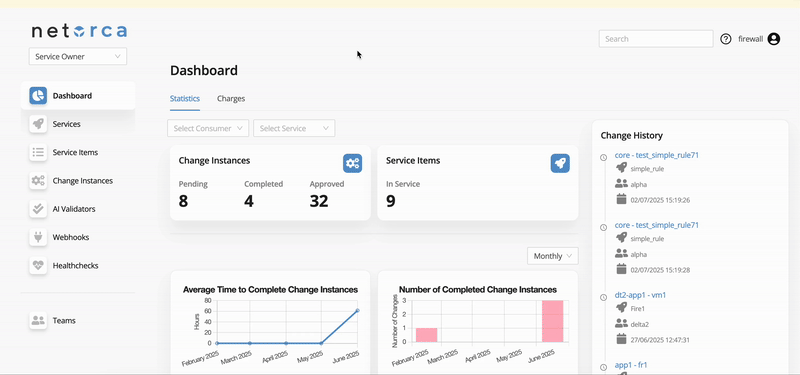Webhooks
NetOrca supports webhooks for Services. When a declaration is submitted and a Change Instance is created for a Service, or during the Change Instance process—for example, if the state of a Change Instance is updated by the Service Owner, NetOrca sends a webhook request to a specified target URL. A common use case for webhooks is triggering an external process such as executing an Ansible playbook.
Create a Webhook
In order to define a webhook for a Service, a POST request must be sent to /v1/external/serviceowner/webhooks/ endpoint with the following body:
POST /v1/external/serviceowner/webhooks/ HTTP/1.1
Content-Type: application/json
Authorization: Token <YOUR_TOKEN>
{
"name": "sample name",
"description": "sample description",
"service": <service_id defined in NetOrca>,
"target_url": "<target_url>",
"authorization": "<auth header, e.g. 'Bearer AwesomeKey'>",
"change_instance_state": <Change Instance's state, e.g. PENDING> or null,
"trigger_wait_time": <number of seconds> (*),
"trigger_cooling_time": <number of seconds> (**)
}
from netorca_sdk import NetOrca
netorca = Netorca(fqdn=<YOUR_NETORCA_BASE_URL>, api_key=<YOUR_NETORCA_API_KEY>)
data = {
"name": "sample name",
"description": "sample description",
"service": <service_id defined in NetOrca>,
"target_url": "<target_url>",
"authorization": "<auth header, e.g. 'Bearer AwesomeKey'>"
}
webhook = netorca.create_webhook(data=data)

Trigger a Webhook
There are 3 ways to trigger a webhook if it is enabled for a Service.
-
Trigger manually

-
Trigger during the Change Instance process
A webhook can also be triggered when a Change Instance reaches a specific state, as specified in the webhook’s
change_instance_statefield. If this field is set, the webhook will automatically fire once the Change Instance transitions to the designated state. -
Trigger at Submission
If the webhook’s
change_instance_statefield is set to null, it will be triggered immediately when a Consumer submits a declaration and a Change Instance is created for the associated Service.
When a webhook is triggered, an HTTP POST request is sent to the target URL, containing key details about the Service, including:
POST <webhook.target_url> HTTP/1.1
Content-Type: application/json
Authorization: <webhook.authorization>
{
"id": <service_id>,
"name": "<service_name>",
"owner": {
"id": <owner_id>,
"name": "<service_owner_name>"
},
"state": ""
}
Webhook Responses
When a webhook is triggered, NetOrca creates a corresponding response object in its database. This object records the HTTP status code and response body returned by the webhook’s target URL. Since webhook triggers are handled asynchronously, the response data may not be immediately available. To manage this, each response object includes a state that reflects the current progress of the HTTP request.
The possible state values are:
| State | Description |
|---|---|
OK |
The Webhook HTTP request was sent and responded successfully. |
FAILED |
The Webhook HTTP request was sent, but the response was corrupted or timed out. |
WAITING_FOR_RESPONSE |
The Webhook HTTP request was sent and is awaiting a response. |
SCHEDULED |
The Webhook HTTP request is queued and waiting to be sent. |
To see the list of Webhook Responses:
HTTP requests Limitations
- (*) Service Owners can set a
trigger_wait_timevalue to prevent the webhook from being triggered multiple times in quick succession. This is useful when multiple submissions occur close together—such as merging several merge requests back-to-back or approving many Change Instances at once—as it helps avoid excessive load by batching and buffering events, triggering the webhook just once. - (**) Service Owners can also set a
trigger_cooling_timevalue to ensures that the webhook is not triggered again immediately after it has already been triggered. By setting atrigger_cooling_time, redundant triggers within a short time frame are prevented, helping reduce load and unnecessary requests. - In addition to the fields above, NetOrca Administrators can configure rate limits to control how many times a webhook can be triggered per minute. This helps prevent overload on external systems and ensures fair usage across multiple services.
- NetOrca Administrators can also set a limit on the number of webhook responses retained in NetOrca. For instance, if the limit is set to 10, only the 10 most recent responses will be stored—older entries will be automatically removed to maintain this cap.